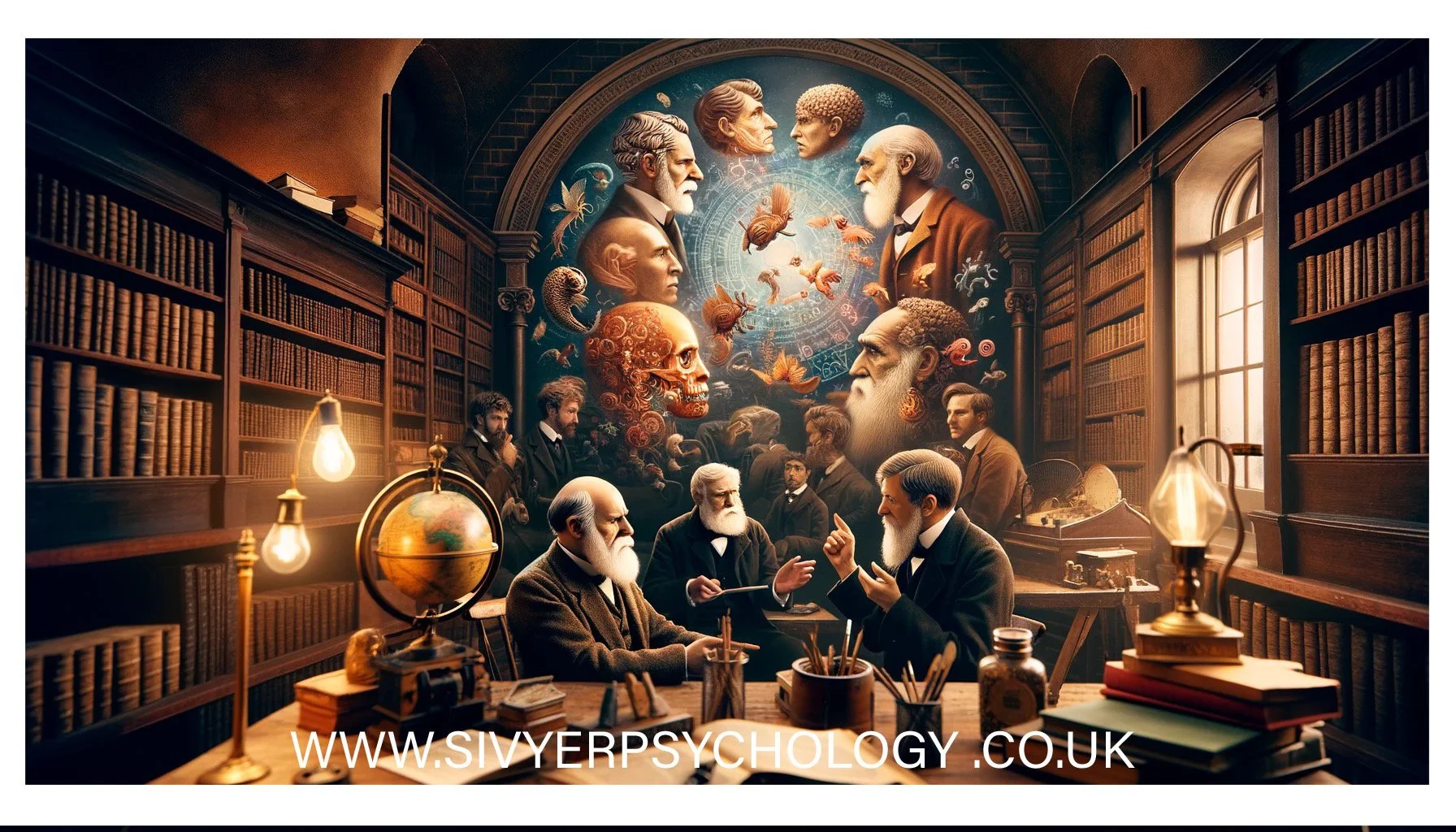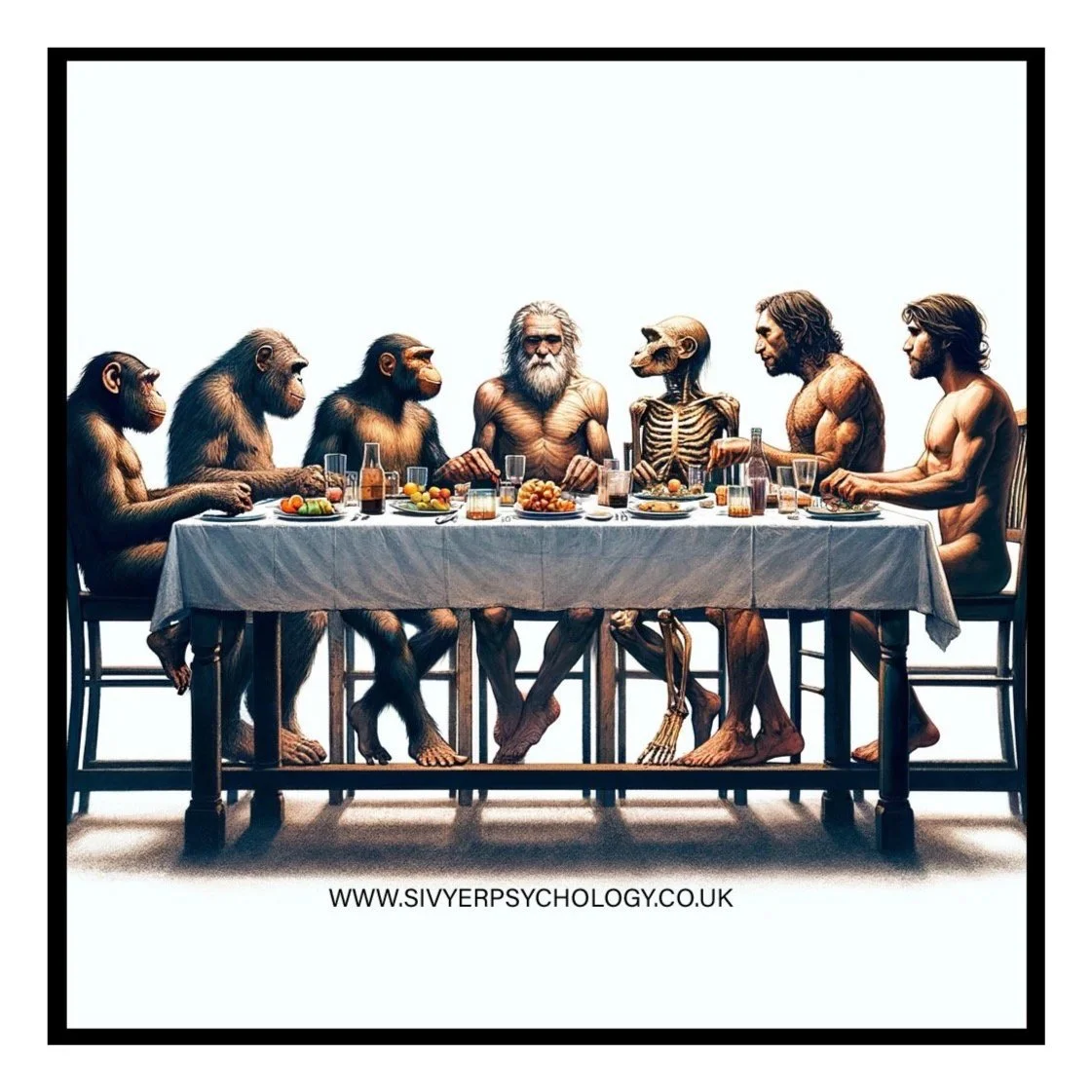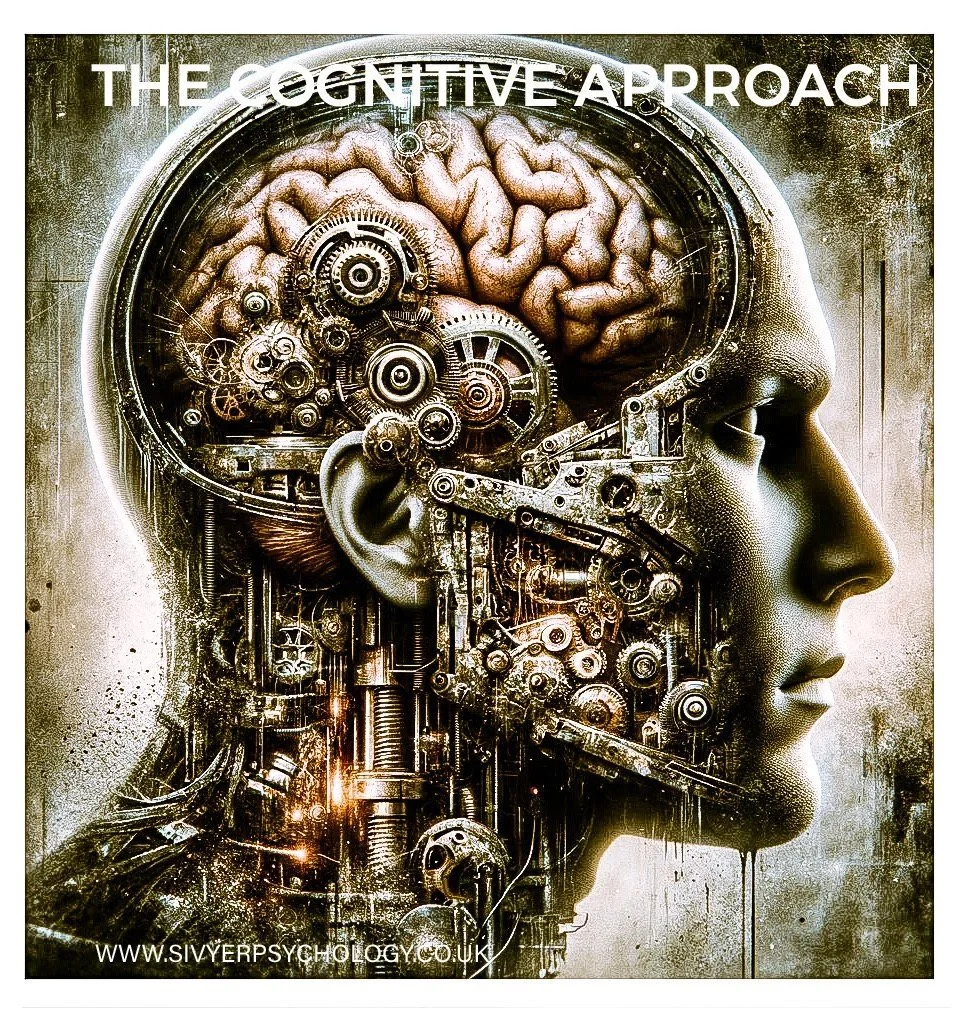COMPARISONS OF PSYCHOLOGICAL APPROACHES
Comparison of approaches involves identifying similarities and differences between the different approaches in psychology. They can be compared in terms of criticisms and positive evaluations
PSYCHOANALYSIS
DEFINITION:
Psychoanalysis is a theory of personality and a therapeutic approach developed by Sigmund Freud. It focuses on uncovering unconscious thoughts, conflicts, and desires that drive behaviour. Central concepts include the id, ego, superego, and psychosexual stages.
KEYWORDS:
Unconscious Mind
Repression
Free Association
Dream Analysis
Transference
Id, Ego, Superego
RESEARCH METHODS:
Case Studies: In-depth analyses of patients (e.g., Little Hans, Anna O.), using qualitative techniques to explore unconscious desires and conflicts.
Free Association and Dream Analysis: Patients are encouraged to verbalise thoughts or dreams, revealing hidden conflicts and repressed feelings.
Psychoanalysis: A therapeutic technique aimed at uncovering unconscious thoughts through dialogue between the patient and the analyst.
MENTAL ILLNESS TREATMENT:
Psychoanalytic Therapy: Aimed at resolving unconscious conflicts through long-term talk therapy. Techniques include free association, transference analysis, and dream interpretation. It focuses on bringing repressed material into conscious awareness to relieve symptoms of mental illness.
NATURE VS. NURTURE:
Interactionist—believes in innate drives (such as the libido) but also emphasises the importance of childhood experiences and parental relationships in shaping behaviour.
REDUCTIONISM:
Psychic Reductionism—reduces behaviour to unconscious drives (e.g., sexual and aggressive instincts) and early developmental experiences.
DETERMINISM:
Psychic Determinism—behaviour is driven by unconscious motives and desires, often beyond conscious control, limiting free will.
SCIENTIFIC STATUS:
Less scientific—theories are often considered untestable or not falsifiable. Relies on subjective interpretations of case studies and lacks empirical validation.
FAMOUS PSYCHOLOGISTS:
Sigmund Freud, Carl Jung, Alfred Adler, Melanie Klein (object relations).
FAMOUS EXPERIMENTS/STUDIES:
Freud’s Case Studies: Little Hans (fear of horses linked to the Oedipus complex), Anna O. (free association and hysteria treatment).
Jung’s Word Association Test: Aimed at revealing unconscious complexes.
FAMOUS ACHIEVEMENTS:
The introduction of the unconscious mind, development of psychosexual stages of development, and the concept of defence mechanisms. Freud’s theories laid the groundwork for modern psychotherapy and concepts like the Oedipus complex.
JUSTIFICATION OF RESEARCH METHODS:
Psychoanalysis is based on the premise that unconscious conflicts and repressed memories shape behaviour. Because these thoughts and desires are not directly accessible, the use of case studies, dream analysis, and free association are justified as methods to access unconscious material. The approach is non-scientific by design, focusing on individual, subjective experiences rather than large-scale empirical studies, and relies heavily on the interpretation of unconscious desires rather than observable behaviour.
BIOPSYCHOLOGY (BIOLOGICAL APPROACH/NEUROSCIENCE)
.
Beliefs: The biological approach posits that biological processes, including genetics, neurotransmitters, brain structures, and neural pathways govern behaviour. It holds that mental health issues and human behaviour can be traced back to these biological factors.
Key Concepts include neurotransmitters (dopamine, serotonin), brain localisation, genetic inheritance, hormonal influence, and neuroplasticity.
MENTAL ILLNESS TREATMENT
Biopsychology treats mental illness primarily through biological interventions:
Medication: Treats mental disorders by correcting imbalances in brain chemicals (e.g., SSRIs for depression, antipsychotics for schizophrenia).
Neurosurgery: In extreme cases, procedures like lobotomies (historically) or modern approaches such as deep brain stimulation (DBS) are used.
Electroconvulsive Therapy (ECT): Still used for severe depression when other treatments fail.
NATURE VS. NURTURE
The biological approach emphasises nature, suggesting that genes and biological processes play a crucial role in shaping behaviour. Environmental factors are secondary but acknowledged regarding neuroplasticity (the brain’s ability to adapt).
REDUCTIONISM
This approach is biologically reductionist, as it reduces complex human behaviour to the workings of the brain, neurotransmitters, and genes. It disregards broader social and psychological explanations.
DETERMINISM
Biological determinism is central, asserting that behaviour is heavily influenced by genetics and neurological factors. Free will is considered limited within this framework.
SCIENTIFIC STATUS
This approach is highly scientific and relies on objective, measurable, and empirical methods. Brain scans (fMRI, PET), twin studies, and neurochemical analysis establish cause-effect relationships between biology and behaviour.
FAMOUS PSYCHOLOGISTS
Roger Sperry: Known for his split-brain research, revealing the specialisation of the brain's hemispheres.
Karl Lashley: Investigated brain localisation and memory.
Paul Broca: Linked specific areas of the brain to language production.
Wilder Penfield: Mapped brain functions via electrical stimulation.
FAMOUS EXPERIMENTS
Split-brain research: Sperry's experiments with patients whose corpus callosum was severed demonstrated the localisation of brain function.
Twin studies (Bouchard et al.): Provided evidence for genetic influences on behaviour by comparing identical twins raised apart.
HM Case Study: Removal of the hippocampus revealed the role of this structure in memory formation.
FAMOUS ACHIEVEMENTS
Discovery of neurotransmitter roles: Dopamine’s involvement in schizophrenia, serotonin in mood disorders.
Localisation of function: Established that different parts of the brain control specific functions, like speech or movement.
Advances in brain imaging: fMRI and PET scans provide real-time insight into brain function.
JUSTIFICATION FOR RESEARCH METHODS
Biopsychology’s reliance on scientific methods is justified by the premise that behaviour is rooted in biology. As the approach assumes behaviour has a biological basis, brain scans, genetic testing, and neurochemical analysis are necessary to observe these biological processes directly. Controlled experiments ensure accuracy, and the scientific status of this approach is strengthened by its empirical, measurable focus. The deterministic nature of biopsychology also requires methods that can establish clear cause-effect relationships between biological factors and behaviour.
EVOLUTIONARY PSYCHOLOGY
t
FORMERLY SOCIOBIOLOGY
DEFINITION:
Evolutionary psychology explains human behaviour through ancestral survival and reproduction strategies, focusing on how evolutionary pressures shape psychological traits.
KEYWORDS:
Adaptive traits
Reproductive success
Survival strategies
Natural selection
RESEARCH METHODS:
Post-hoc Theories: Explains modern behaviours as evolutionary adaptations (e.g., mate selection, aggression).
Fossil Evidence: Analyses of hominid remains to trace brain evolution.
Comparative Studies: Cross-cultural and animal behaviour research to identify universal evolved psychological mechanisms.
MENTAL ILLNESS TREATMENT:
It focuses on understanding mental illness through the lens of adaptive traits. Mental illnesses are seen as evolutionary mismatches in modern environments rather than direct biological issues.
NATURE VS. NURTURE:
Strongly nature—behaviour is predominantly shaped by evolutionary pressures for survival and reproduction.
REDUCTIONISM:
Evolutionary reductionism—evolutionary adaptations explain behaviour.
DETERMINISM:
Evolutionary determinism—behaviour is often viewed as pre-determined by ancestral survival strategies.
SCIENTIFIC STATUS:
Highly theoretical—Critics argue that many theories are post-hoc and challenging to test, but the approach is supported by comparative and cross-cultural research.
FAMOUS PSYCHOLOGISTS:
Charles Darwin: Key figure in evolutionary theory.
David Buss: Known for research on mating strategies.
Leda Cosmides & John Tooby Developed the theory of modularity in the brain, suggesting domain-specific evolved psychological mechanisms.
FAMOUS EXPERIMENTS/STUDIES:
David Buss’ Cross-Cultural Study Showed universal patterns in mate preferences tied to reproductive success.
Cosmides & Tooby's Modularity Theory suggested that humans evolved domain-specific psychological systems to handle different survival problems.
FAMOUS ACHIEVEMENTS:
It explains human behaviour, such as mate selection, aggression, and altruism, in evolutionary terms.
Universal psychological traits—exploring human behaviours consistent across different cultures, demonstrating evolved adaptations.
Evolutionary psychology ties much of human behaviour to ancestral environments, examining how evolutionary pressures shaped current psychological traits for survival and reproduction.
BEHAVIOURISM (ALSO KNOWN AS LEARNING THEORY)
DEFINITION:
Behaviourism is a psychological approach that focuses on observable behaviours, rejecting internal mental states. Learning is understood through conditioning: behaviours are shaped by environmental stimuli and reinforcements. Key concepts include classical conditioning, operant conditioning, and the idea that the mind is a "black box"—meaning only observable input (stimuli) and output (behaviour) matter.
KEYWORDS:
Classical Conditioning
Operant Conditioning
Black Box
Blank Slate (Tabula Rasa)
Empiricism
Observable Behaviour
Experience-Related Plasticity
RESEARCH METHODS:
Lab Experiments: Highly controlled studies examining how stimuli and reinforcements shape behaviour (e.g., Skinner's operant conditioning box, Pavlov's dogs).
Animal Research: Frequently used to develop and test learning theories (e.g., Skinner’s box experiments, Pavlov’s classical conditioning).
Behaviour Modification Techniques: Experimental methods to adjust behaviour via reinforcement (positive or negative).
MENTAL ILLNESS TREATMENT:
Behavioural Therapy: Uses techniques like systematic desensitisation, token economies, and aversion therapy. The focus is on changing maladaptive behaviours through reinforcement and punishment (e.g., treating phobias, addictions).
NATURE VS. NURTURE:
Nurture-focused: Behaviour is learned from the environment, through experiences, and reinforcement schedules. No emphasis on innate traits; people are seen as blank slates (Tabula Rasa) shaped entirely by external stimuli.
REDUCTIONISM:
Environmental Reductionism: Reduces complex behaviours to simple stimulus-response associations, ignoring internal mental processes.
DETERMINISM:
Hard Determinism: Behaviour is determined entirely by environmental stimuli and reinforcement histories, leaving little room for free will.
SCIENTIFIC STATUS:
Highly scientific: Uses controlled, measurable, and observable behaviours in laboratory experiments, often with high control over variables.
FAMOUS PSYCHOLOGISTS:
B.F. Skinner (operant conditioning)
John B. Watson (classical conditioning)
Ivan Pavlov (classical conditioning)
Edward Thorndike (law of effect)
FAMOUS EXPERIMENTS:
Skinner’s Operant Conditioning: Skinner Box experiments demonstrated the power of reinforcement and punishment in shaping behaviour.
Pavlov’s Classical Conditioning: Pavlov’s dogs revealed how stimuli could be associated with reflexive responses (e.g., salivation).
Watson and Rayner’s Little Albert Experiment: Demonstrated that emotional responses (fear) could be conditioned.
FAMOUS ACHIEVEMENTS:
Established the principles of conditioning (classical and operant) as fundamental mechanisms of learning.
Developed behaviour modification techniques used widely in therapeutic settings (e.g., token economies, desensitisation).
Showed that observable behaviour could be systematically studied and shaped through reinforcement and punishment schedules.
JUSTIFICATION OF RESEARCH METHODS:
Behaviourism relies on observable traits and empirical evidence as it dismisses internal mental states like thoughts or emotions. The approach focuses on scientific control and objectivity, using experiments to demonstrate how behaviour is shaped by reinforcement, punishment, and environmental stimuli. The premise is that psychology should study what can be directly measured and modified, thus behavioural experiments, often with animals and high control, are its primary research tool.
SOCIAL LEARNING THEORY
DEFINITION:
Social Learning Theory (SLT) suggests that learning occurs through observation, imitation, and modelling within a social context. Key processes include attention, retention, reproduction, and motivation.
KEYWORDS:
Modelling
Imitation
Vicarious Reinforcement
Self-Efficacy
Attention
Reproduction
Mirror Neurons
RESEARCH METHODS:
Observational Studies: Focuses on learning by watching others (e.g., Bandura’s Bobo Doll experiment).
Experiments: Tests the impact of observed behaviour (e.g., aggression) on learners (Bandura).
Correlational Studies are sometimes used to explore relationships between observational learning and behavioural outcomes, although they are less common than experiments.
Case Studies and Interviews: Occasionally used to gather detailed qualitative data on observed learning experiences.
MENTAL ILLNESS TREATMENT:
Modelling Therapy: Demonstrates positive behaviours for patients to imitate.
Social Skills Training: Helps individuals with mental health conditions (e.g., anxiety or autism) develop appropriate behaviours through observation and practice.
Self-Efficacy Training: Enhances confidence in abilities, which plays a role in therapeutic approaches to depression.
NATURE VS. NURTURE:
Behaviour is primarily nurtured and shaped through social interactions and environmental observation. Biological factors, such as mirror neurons, also play a supporting role.
REDUCTIONISM:
Partially reductionist—focuses on observable behaviours and acknowledges the importance of cognitive factors (e.g., attention, memory, and decision-making processes).
DETERMINISM:
Reciprocal determinism—behaviour is influenced by and influences the environment, mediated by personal cognitive factors, making it less deterministic than behaviourism.
SCIENTIFIC STATUS:
Scientific—uses controlled experiments (e.g., Bandura’s studies) to observe measurable behaviour, but also recognises the complexities of social and cognitive processes.
FAMOUS PSYCHOLOGISTS:
Albert Bandura.
FAMOUS EXPERIMENTS/STUDIES:
Bandura’s Bobo Doll experiment: Demonstrated that children imitate aggressive behaviours observed in adults.
Studies on vicarious reinforcement: Showed that people are influenced by seeing others being rewarded or punished for their actions.
FAMOUS ACHIEVEMENTS:
Self-Efficacy Theory: Bandura developed the concept that belief in one’s abilities influences learning and behaviour.
Understanding the role of vicarious learning, where individuals learn not just through direct experience but by observing the consequences of others’ actions.
Influence on media psychology: Highlighted how exposure to media violence could shape real-life behaviour.
JUSTIFICATION OF RESEARCH METHODS:
Social Learning Theory employs scientific methods, particularly experiments and observational studies, to empirically measure how behaviour is learned through social contexts. This fits the theory’s emphasis on nurture and its commitment to studying observable, measurable behaviours, while acknowledging the cognitive processes involved in modelling and imitation. The approach remains scientifically robust due to its focus on replicable findings, controlled environments, and measurable outcomes.
COGNITIVE PSYCHOLOGY
.
DEFINITION:
Cognitive psychology focuses on internal mental processes, such as memory, perception, and problem-solving, using scientific methods to understand how people acquire, process, and store information.
KEYWORDS:
Information processing
Schemas
Memory models
Cognitive distortions
RESEARCH METHODS:
Lab Experiments: Utilised to test models of cognitive functions like memory, attention, and perception.
Brain Scans: fMRI, PET scans, and EEGs are used to observe brain activity related to cognitive tasks.
Case Studies & Cognitive Neuropsychology: Studies of patients with brain damage (e.g., HM) to understand cognitive functions.
Cognitive Science: Uses computational models and simulations to represent mental processes.
MENTAL ILLNESS TREATMENT:
Cognitive-Behavioural Therapy (CBT): Focuses on reframing negative thought patterns and altering dysfunctional beliefs to treat conditions like depression and anxiety.
NATURE VS. NURTURE:
Emphasises both—recognises innate cognitive structures (nature) and the influence of learning and experience(nurture) on mental processes.
REDUCTIONISM:
Machine reductionism—compares the mind to an information processor, breaking down mental functions into distinct stages, like input, processing, and output.
DETERMINISM:
Soft determinism—acknowledges that cognitive processes influence behaviour, but individuals can still make flexible, conscious choices.
SCIENTIFIC STATUS:
Highly scientific—Cognitive psychology uses controlled lab experiments, brain scans, and cognitive models to empirically test theories.
FAMOUS PSYCHOLOGISTS:
Jean Piaget: Known for his theory of cognitive development.
Elizabeth Loftus: Renowned for her work on memory and misinformation.
Aaron Beck: Developed cognitive therapy, particularly for depression.
FAMOUS EXPERIMENTS/STUDIES:
Loftus and Palmer’s study on memory distortion: Showed how post-event information can alter memories.
Baddeley’s research on working memory: Developed the multi-component working memory model.
FAMOUS ACHIEVEMENTS:
Development of memory models (e.g., multi-store model).
Understanding and treatment of cognitive distortions in mental illnesses such as depression.
Contributions to understanding cognitive biases in perception and decision-making.
Cognitive psychology emphasises the scientific study of mental processes, understanding how thoughts and information processing influence behaviour.
HUMANISM
DEFINITION:
Humanism is a psychological approach that emphasises personal growth, free will, and the importance of individual experience. It focuses on self-actualisation, self-awareness, and the holistic understanding of human behaviour.
KEYWORDS:
Self-actualisation
Free will
Empathy
Holistic
Personal growth
Unconditional positive regard
RESEARCH METHODS:
Qualitative Methods: Case studies, unstructured interviews, and client-centred therapy to explore subjective experiences. Humanists argue that these methods are justified because human experiences are too complex to be reduced to numbers or manipulated in artificial lab settings.
Case Studies: Used to explore individual personal growth and self-actualisation (e.g., Maslow’s work with high-achieving individuals).
MENTAL ILLNESS TREATMENT:
Client-centred therapy: Focuses on empathy, unconditional positive regard, and personal growth to help individuals reach self-actualisation. It sees mental illness as a blockage in personal growth or an incongruence between self-perception and reality.
NATURE VS. NURTURE:
Focuses more on nurture, emphasising the environment’s role in fostering growth. However, it highlights free willas individuals have the capacity to shape their own lives.
REDUCTIONISM:
Non-reductionist—Humanism views individuals as holistic beings and opposes breaking down behaviour into smaller components like biological processes.
DETERMINISM:
Free will is a core concept of humanism, which emphasises self-determination, autonomy, and the capacity for personal change.
SCIENTIFIC STATUS:
Not traditionally scientific—uses subjective, qualitative data. Humanists argue that methods like case studies and interviews are more suited to capturing the richness of human experience, and are justified based on the belief that human beings are more than just biological systems.
FAMOUS PSYCHOLOGISTS:
Carl Rogers: Developed client-centred therapy.
Abraham Maslow: Created the hierarchy of needs.
FAMOUS EXPERIMENTS:
No major experiments, but key contributions include Maslow’s hierarchy of needs and Rogers' theory of unconditional positive regard.
FAMOUS ACHIEVEMENTS:
Person-centred therapy (Rogers)
Self-actualisation theory
Maslow's hierarchy of needs
Humanism places a strong emphasis on personal agency, growth, and emotional well-being, making it a unique approach focused on subjective experiences over scientific empiricism










